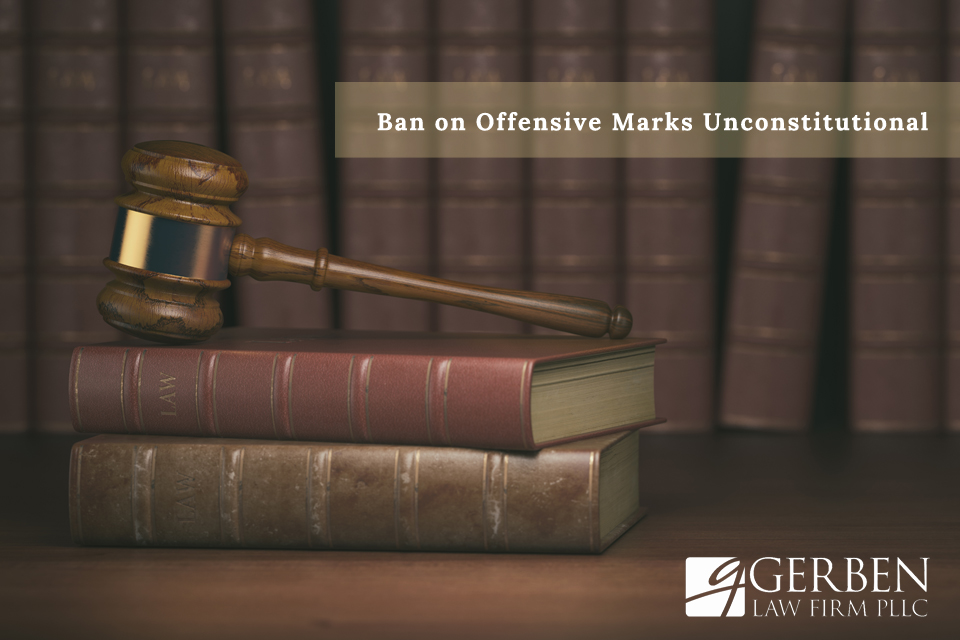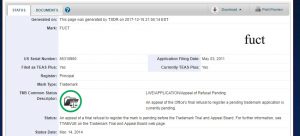Breaking: Federal Circuit Holds Ban on Offensive Marks Unconstitutional

NEED TO REGISTER YOUR TRADEMARK?
Gerben IP has registered over 6,500 trademarks since 2008. Contact our attorneys about our flat-fee trademark search and registration package.
The Federal Circuit held today that the U.S. trademark law’s ban on offensive and derogatory marks is unconstitutional, following a similar decision by the Supreme Court earlier this year.
Several months ago, in a landmark trademark law decision, the Supreme Court found that the Lanham Act’s ban on disparaging marks was unconstitutional. It held that the denial of a trademark registration based on the content or message of the underlying trademark is “view point discrimination” and that the law’s restrictions did not meet “strict scrutiny” under the First Amendment.
However, the Supreme Court case decision was limited to disparaging trademarks, which “disparage” a specific group of people. The case did not directly deal with the Lanham Act’s similar ban on “offensive,” “scandalous” and “immoral” trademarks. Many trademark attorneys (including those at Gerben IP) believed that it was only a matter of time before those restrictions were also thrown out.
Today, the Federal Circuit held that the Lanham Act’s ban on “offensive,” “scandalous” and “immoral” trademarks was also unconstitutional, erasing over seventy years of precedent and opening the doors to a more “offensive” trademark registry.
How We Got Here – In Re Brunetti

Brunetti appealed the decision to the Federal Circuit, who decided to wait until the Supreme Court had ruled on the similar case, Matal v. Tam, before issuing their decision.
Today, the Federal Circuit overturned the Trademark Trial and Appeal Board in a decision that opens the floodgates to derogatory, scandalous and immoral trademarks that previously would not have qualified for federal trademark registration.
The Floodgates are Open
Since the applicants in the Tam and Brunetti cases appealed their decisions, the USPTO has been suspending trademark applications it would usually deny under Section 2(a). With today’s decision, those applications will now move forward, and applicants with all sorts of marks will rush to file applications to protect words, phrases, and pictures that were not previously registerable.
What remains unclear is whether there are any limits to what the USPTO can restrict. For example, Section 2(a) of the Lanham Act bans the registration of flags and certain insignia. Is that a restriction of free speech? What about the ban on registering a trademark that includes the name of a living person without their consent (like this “Dump the Trump” application that was denied)?
Are there any content-based restrictions? Can someone, for example, register hate-speech that incites violence? Can someone register a depiction of, for example, an illegal act? In a concurring opinion in Brunetti, Judge Dyke tried to address some of these issues, saying that at least some part of Section 2(a) could be kept and used in the case of “obscene” materials, which are not protected under the First Amendment. The majority disagreed with this assertion, stating that the court would be improperly rewriting the statute, implying that it was up to Congress, not the Federal Circuit, to write a law that would meet the strict scrutiny standard for restricting free speech.
TRADEMARK MONITORING
Trademark owners need to monitor the USPTO database and the marketplace for potential infringement. Contact our attorneys today and ask about our affordable trademark monitoring service.
There are two big take-aways from this case.
The first is that trademark owners can now expand their potential trademarks into edgy, offensive material and be able to register it with the USPTO. This opens doors for a lot of trademark owners that previously were unable to gain valuable benefits through federal registration and, in the long term, can help create strong, long-lasting (if somewhat off-color) trademarks.
The second is that existing brand owners will need to be extra vigilant in policing their trademarks, because now the USPTO has one less tool at hand to weed out potentially damaging trademarks. Now, someone could register a trademark that may not only be infringing, but also could be highly offensive to some people, increasing the chances of irreparable harm.
Thinking about registering a potentially offensive trademark? Worried about how you can protect your existing brand? Contact our trademark attorneys today for a free consultation.
Do you need assistance with a trademark matter?
Contact an Attorney Today